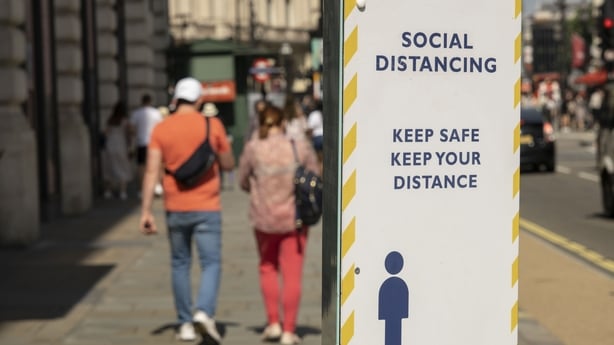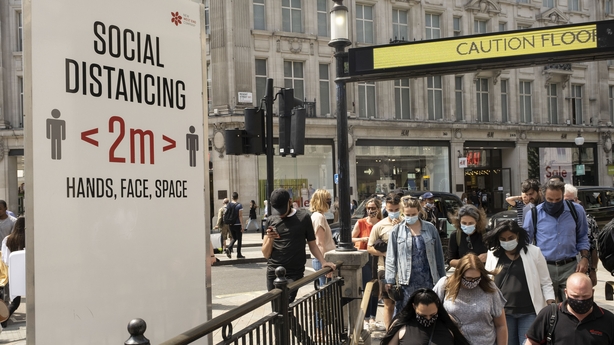Reports in England say enforced mask wearing will end and social distancing will no longer be required as part of "freedom day" unlocking on 19 July.
British Prime Minister Boris Johnson is understood to be preparing to update the public this week on his plans for easing coronavirus restrictions in England.
Multiple newspapers suggested he believes a host of domestic measures can end on his "terminus date".
According to The Sunday Times, mask wearing will become voluntary in all settings and the one metre-plus rule in hospitality venues will end, meaning a return to drinking at the bar without the requirement for table service.
Mass events, including festivals, will also be allowed under the proposals for the final stage of the road map out of lockdown, the paper said.
The government also expects to receive the results of the taskforce reviews into the use of so-called vaccine passports and the future of social distancing to be made available this week, the Sunday Express said.
We need your consent to load this rte-player contentWe use rte-player to manage extra content that can set cookies on your device and collect data about your activity. Please review their details and accept them to load the content.Manage Preferences
'Return to normality as far as possible'
This morning, a senior government minister said life will "return to normality as far as possible" after 19 July in England as the country moves into the "final furlong" of coronavirus restrictions.
Communities Secretary Robert Jenrick appeared to all but confirm the reports as he said the impact of the vaccine on preventing serious illness meant it was time to "roll back" the "difficult" restrictions that have been in place for the past 16 months.
He told the BBC's Andrew Marr Show: "It does look as if, thanks to the success of the vaccine programme, that we now have the scope to roll back those restrictions and return to normality as far as possible."
Mr Jenrick said that, although cases were rising, they had not translated into "serious illness and death", allowing the government to be "positive" about unlocking on 19 July.
"It does feel as if we are now in the final furlong, in a period in which we can start to live with the virus and move on with our lives," he said.
"It does look like the data is in the right place… and isn't translating into serious illness and death"
— BBC Politics (@BBCPolitics) July 4, 2021
Housing Secretary Robert Jenrick talks to #Marr about Covid restrictions being lifted on 19 Julyhttps://t.co/PAsEPfVNSv pic.twitter.com/87KHNXCmy6
However, an expert advising the government's coronavirus response has said he will continue to wear a face mask "indefinitely".
Professor Adam Finn, from the Joint Committee on Vaccination and Immunisation (JCVI), said mask wearing is extremely valuable under certain circumstances and he does not plan to ditch his masks this month.
He told Sky News' Trevor Phillips On Sunday programme: "Well on a personal level I shall certainly be continuing to wear a mask if I've got any symptoms or if I'm in an enclosed space with lots of other people for a prolonged period of time, indefinitely in fact."
Prof Finn explained: "I think we learned, as paediatricians, we learned that we can avoid massive problems with children getting sick in the winter by doing these kind of measures.
"We simply didn't see the epidemics of respiratory viruses last winter that we've seen every year throughout my career.
"So I actually now completely understand it, whereas I was puzzled before when I saw Asian people on the Tube wearing masks in the pre-pandemic era.
"So I think mask wearing is obviously something we've learned is extremely valuable to do under certain circumstances. That doesn't mean I'll wear a mask all the time but it does mean I will some of the time."

Meanwhile, Health Secretary Sajid Javid, who replaced Matt Hancock following his resignation last weekend, reiterated his belief that the country would need to find ways to live with the virus, arguing it could not be "eliminated".
The minister wrote in the Mail on Sunday: "We are going to have to learn to accept Covid and find ways to cope with it, just as we do with flu."
Case numbers match winter wave
According to UK government Covid data, case numbers at the end of June are similar to those during the winter wave in January.
For instance, 20,479 infections were reported on 29 June and 20,089 on 26 January.
However, the number of daily hospitalisations and deaths are much lower in the second half of the year.
On 29 June, data shows more than 350 people were admitted to hospital, compared with 3,147 on 26 January.
The figures show 23 people died on the same day in June, but more than 1,600 died on the same day in January.
Taking another two days in January and June – more than 28,000 infections were recorded on 28 January and 26,068 on 30 June.
Fourteen people were reported to have died on that day in June, while more than 1,200 deaths were recorded on 28 January.

Health experts say that this shows vaccines against the coronavirus are working.
More than 85% of UK adults have now received their first dose of a vaccine and 63% are fully vaccinated.
"The vaccines give over 90% protection against severe disease - in other words hospitalisations," said Stephen Powis, National Medical Director of NHS England, on the BBC's Andrew Marr Show this morning.
Mr Powis said that the impact of the virus has "severely weakened" due to inoculations.
He acknowledged though that the link is not totally broken as there are people in hospital who have been vaccinated. Other health professionals are urging caution.
"The vaccine clearly isn’t winning at the minute because cases are still going up," Martin McKee, Prof European Public Health, London School of Hygiene and Tropical Medicine, told RTÉ News.
He said one of the problems is that the discussion has been based on case, hospitalisation and death numbers.
"We have forgotten about the really quite large number - up to one million people in the United Kingdom - who are suffering with long Covid," he said.
"Now obviously the range of severity varies a lot, but for many this is a very disabling condition and could be with them for a very long time to come. So very important that we consider this in our considerations."
Additional reporting Jackie Fox

